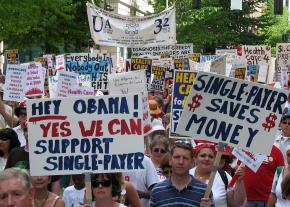Labor’s single-payer advocates press ahead
, an emergency room nurse in Chicago and member of the National Nurses United, reports on a meeting of labor supporters of single-payer health care.
THE LABOR Campaign for Single-Payer Healthcare (LCSP) met just outside of Washington, D.C., on March 6-7. With over 125 activists and union leaders from 25 states participating, this was the second such conference to discuss how to win single payer health care, a system that would cover everyone and cut out the private insurers.
One significant achievement since the group's meeting last year in St. Louis was the unanimous passage of Resolution 34 at the AFL-CIO's national conference in September 2009, which put the federation on the record in favor of a Medicare for all-type solution to the health care crisis.
While there was agreement at the conference on how important this is, many people expressed frustration about the lack of union resources being devoted to achieving the stated goal of "establishing health care as a human right."
The AFL-CIO's resolution also includes the following statement: "Universal health care does not mean mandating that everyone must buy a health insurance policy and then handing them the bills." Such a mandate, of course, is the centerpiece of proposed legislation being pushed by President Barack Obama.

Certainly none of the delegates to the LCSP conference saw the current Senate legislation as being as anywhere close to the goal of single payer.
"Achieving Medicare for All is critical to the future of the labor movement," said David Newby, president of the Wisconsin State AFL-CIO. "Our movement is growing because the proposed national reforms fall far short of the health security that all workers need. Our economic future depends on making the right policy choices on health care--and that's single payer."
Communications Workers of America President Larry Cohen put it this way: "All of us involved in the fight for health care reform know that single payer is the only real solution. Everything else is just a step along the way. Our union is committed to single payer, to bringing our health care system into the 21st century."
NEVERTHELESS, THERE was significant debate at the conference on which way forward for our movement.
In the opening panel, Dr. Margaret Flowers of Physicians for a National Health Program stated that the experience of the last year showed the importance of building a movement for health care reform that is "independent of any political party."
Michael Lighty, director of public policy for the National Nurses United, argued that the "public option" advanced by many Democratic leaders as a "substitute" for single payer was simply a ploy to get organized labor behind the Obama legislation--only to be dropped later with the expectation that the unions would continue to support the White House proposals.
On the other hand, some delegates voiced concerns about opposing the Obama package out of fear that they would be painted as aligning with the right wing.
Rep. John Conyers (D-Mich.), author of the single-payer bill HR 676, said that he would "hold his nose" and vote for Obama's plan because "Republicans want Obama to fail." Conyers has already voted for HR 3200, the House version of the Democrats' health care legislation; only two representatives voted against it because it wasn't a single-payer plan.
The vacillating nature of Democratic politicians like Conyers--who are beholden to a party that wants to remain in power--is neither new nor surprising. However, a number of participants at the conference agreed with Conyers that labor single-payer supporters ought to give critical support to the Obama plan.
The positions of activists at the conference seemed torn between roughly three views: first, supporting whatever health care reform legislation that comes forward, in the hope that it will help at least some people; second, remaining agnostic; and third, openly opposing the Obama plan because it entrenches the insurance companies' dominant role in the system and could sour people to genuine reform in the future when the current legislation fails to improve our health care system.
In this debate, it's important for supporters of a single-payer solution to stick to their principles. Getting on the bandwagon to support the current legislation will only undermine or even discredit our efforts.
As Stewart Acuff, chief of staff of the Utility Workers Union of America, put it, real reform "won't be delivered by politicians--change has only come from the mobilization of working people."
The audience was clear in its agreement on that point. Whether or not the Obama proposals become law, we have to keep working to make our movement larger and prepare for the long fight ahead--and keep pushing for a Medicare-for-all solution.


